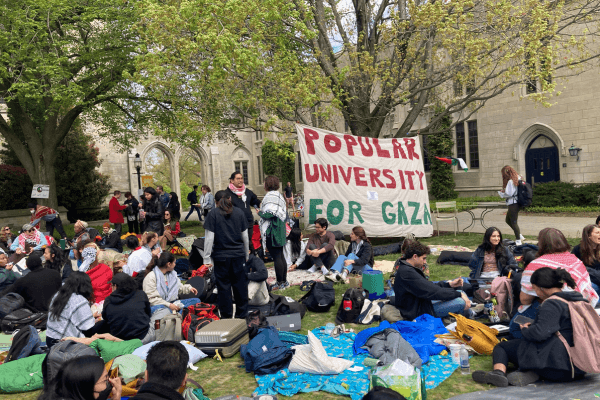One year ago, the murder of George Floyd shook our nation. As our news and social media feeds bombarded us with footage of another unarmed Black man’s brutal killing, we had to decide if we would pay attention, if we would endure the trauma of yet another Black life being destroyed, or if we would turn away.
Many people in this country — and many others around the world — paid attention. We could not ignore the horror of Derek Chauvin kneeling on George Floyd’s neck for 9 minutes, 29 seconds as Floyd cried, “I can’t breathe.” Some of us watched as Floyd lay dying and unresponsive. That horrific moment is forever etched in our memory — and we reached a breaking point. We decried the violence and declared, “enough is enough.”
“We were all spectators,” said Into America podcast host Trymaine Lee on a recent episode, “haunted by what we saw and what we felt, but distanced spectators nonetheless.” But as Lee noted, not everyone had “the privilege of distance.” The direct witnesses of Floyd’s murder included Christopher Martin, the then 18-year-old clerk who worked at the local store and called police about the reportedly counterfeit $20 bill; a year later, Martin told Lee he still wrestles with thoughts about what might have happened if he had not made that call. Darnella Fraser, the then 17-year-old whose video of the entire incident has been called “one of the most important civil rights documents in a generation,” testified during Chauvin’s trial that she was kept up at night because she wished she could have done more.
What does this mean for us? It means that yet another generation is faced with the brokenness of our law enforcement and criminal justice system — and change will not come unless we work to bring about that change.
The number of people killed by police violence has remained steady since 2013. From March 29 to April 18, as testimony was given during Derek Chauvin’s trial, law enforcement killed an average of more than three people each day, including 20-year-old Daunte Wright in Minneapolis. This traumatized country cannot take a moment to breathe; we are weary and suffocated by the ongoing violence across the United States.
On the eve of the one-year anniversary of George Floyd's death, I spoke with Benjamin Crump, a national civil rights leader who has served as the lead attorney for the families of Floyd, Ahmaud Arbery, Breonna Taylor, Trayvon Martin, and other Black people wrongfully killed by police or vigilantes.
“As we continue to pray to make America live up to its promise of liberty and justice for all, we need to also encourage our congregations to act,” Crump told me, “… because even though we are finally having this conversation about racial reckoning in America, talk is cheap. Your actions speak louder than your words ever will.”
Some churches are working toward change by hosting webinars on race, racism, law enforcement or articulating the role of people of faith in this critical moment. Pastors work hard to make sense of the week's news in their sermons, while also shepherding the members of their communities who are facing these issues in their everyday lives. Activists continue to protest and call for systemic change. Media are focusing more attention on justice reform. Municipalities are implementing patchwork police reforms.
Despite these efforts, I still find myself wondering whether anything has truly changed. And in some ways, not much has — at least, not yet. However, we had one thing: the conviction of Derek Chauvin.
While Chauvin’s conviction was not “justice,” it did represent a step toward accountability. Justice would have been to right a wrong and we cannot bring George Floyd back to his daughter, his family, and friends; however, we can ensure those who caused his death are held accountable.
In a recent issue of Studies in Christian Ethics, Andrew Torrance writes that accountability often is thought of “as a threat to the person who fails in their particular role.” But as Torrance argues, that is a limited view of accountability’s value; at its fullest, accountability is about how we relate to God and to one another, and it can serve to build up persons rather than threaten to tear them down. It is about God and neighbor. He writes that accountability “is grounded in the understanding that God creates human beings to flourish not just by but in embracing God’s authority over who they are.”
Accountability is now a major part of the conversation about legislation to transform law enforcement at the federal level; these conversations center on qualified immunity, which grants police immunity from civil suits unless the plaintiff can show a constitutional violation.
The call for an end to qualified immunity, which would hold police accountable when they wrongfully take a life, is coming from a broad, bipartisan group of supporters. Ending qualified immunity, according to the Law Enforcement Action Partnership, “will not bring open season upon law enforcement. It will simply allow judges to hear the facts of the most egregious cases, which are currently causing the public perception that police are above the law.” The George Floyd Justice in Policing Act, in its current iteration, proposes ending qualified immunity for police. Some lawmakers say this is a barrier to getting the bill passed, but it is an aspect of reform that is long overdue.
“We have to understand that until we hold these officers accountable, then I don’t believe they are going to ever do anything differently,” Crump told me. “They say the definition of insanity is to do the same thing and expect different results. Well, we know that qualified immunity is one of the big reasons why police officers and police departments are not held accountable, so until we have that amended or abolished, we are going to continue to see Black people killed by the police unnecessarily, unjustifiably, and unconstitutionally.”
While ending qualified immunity and passing police reform is a critical step, it is only a first step. As Villanova Ph.D. student Nathaniel Grimes and associate professor of theology and religious studies Vincent Lloyd point out, no single federal law can fully address the crisis we face in policing because current policing practices are rooted in the racist origins of this country, which we fail to acknowledge and address.
“Police are a cornerstone of systems of racial and economic domination,” they write in The Bias. “In the US South, police grew out of slave patrols, tasked with returning runaways and terrorizing the Black population. … the function of policing has not essentially changed today.”
Anthony Bradley, professor of religious studies at The King’s College, says additional steps are needed to begin approaching accountability and healing. “The unfortunate truth is that many of the reform proposals as they currently read will not heal decades of immediate pain, trauma, and violence, not to mention centuries of social, economic, and educational failures in governmental policy,” he writes.
As we reflect on what has and has not happened over the past year, we must be vigilant and continue to push for transformation in policing. We must also recognize that we have experienced collective trauma over the past year, and it will take effort to begin healing from it.
“In my mind, healing is a part of the struggle,” Crump told me. “… So I pray, ‘God I am not asking you to keep the storms from coming upon me, I pray that you give me the fortitude to make it through the storms.’ That’s what we have to pray for.”
Got something to say about what you're reading? We value your feedback!








